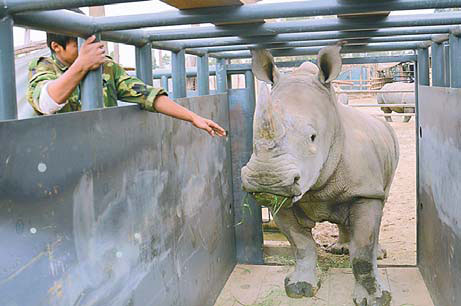Rhinos to return after 80 years
Updated: 2013-03-29 07:09
By Hu Yongqi in Beijing and Guo Anfei in Kunming (China Daily)
|
||||||||
|
A breeder prepares to clean a rhinoceros at Yunnan Wild Animal Park in Kunming, the provincial capital, last Thursday. Li Li / for China Daily |
Rhinoceroses from South Africa will be moved into a national park in Pu'er on Saturday, as officials rebuild a home for the species that vanished 80 years ago from Southwest China's Yunnan province.
The move is expected to produce a herd of rhinos in the wild in three to five years.
In July 2010, seven rhinoceroses, originally from the wild, arrived at Yunnan Wild Animal Park in Kunming, the provincial capital. After two years and eight months of getting accustomed to the local environment, the rhinos can now be released back into the wild, experts said.
In 2009, Yunnan Wild Animal Park initiated a plan with Taiyanghe National Forest Park in Pu'er city to reintroduce some rhinoceroses into the province from South Africa. After a year of negotiations, South Africa approved the request and sold Yunnan nine rhinos, of which seven were kept in an area inaccessible to visitors in the wild animal park.
"Considering South Africa has more rhinos in the wild, we turned to the African country for help," said Tang Yangchun, deputy general manager of Yunnan Wild Animal Park.
Yunnan's history as a habitat for rhinos ended in 1933 when the last two rhinos were hunted down, Tang said during a symposium on rhinos in Kunming four years ago. Animal experts agreed rebuilding rhino groups in Pu'er was a feasible way to reintroduce the species in the area. Unlike carnivores, rhinos won't fundamentally change the local ecology in Pu'er, Tang said.
Before coming to Kunming, the rhinos lived in the wild in South Africa.
Jiang Xuelong, a researcher at the Kunming Institute of Zoology of Chinese Academy of Sciences, said the establishment of rhino groups in China will raise awareness of the harmonious interaction of animals, nature and humans.
Qian Fuchun, a former deer breeder, picked up the rhinos when they were shipped from South Africa to Guangzhou, capital of Guangdong province.
Qian said at first sight, they were frightening. "A 4-year-old rhino is already huge, and its horn on its nose is terrifying. Besides, the animals looked so ugly when I saw them," he said.
He recalled that they ran into a fence "because the wild animals were scared of the wooden walls". No one could approach them in the first two months, and several breeders quit.
As time went on, Qian saw the hostility reduced, and he touched one rhino's tail one day. Surprisingly, the rhino didn't react in anger. Instead, it asked for more grass by shaking its bottom.
After three months, Qian and his colleagues could climb on the back of the rhinos and ride them for a minute as the interaction deepened.
The rhinos have grown mature, three years after they came to Kunming, when they were an average of 4 years old. Breeders grouped the three male and four female rhinos into small "families" so they would reproduce when released into the wild, Qian said.
Usually, large herbivores such as rhinos must be given tranquilizers before being loaded into a transportation cage. However, considering the side effects, breeders decided instead to coax the rhinoceroses into the cages, allowing them to become familiar with the vehicle. On March 19, cages tailored for carrying rhinos were brought to the wild animal park.
Liu Chunbiao, another breeder, said the rhinos had to practice how to get into the cages and be transported to the new home. "We even had to lure the rhinos because they didn't want to be trapped," Liu said.
Liu said rhinos like to be tickled, and he will do that on the long trip to Pu'er to comfort the animals.
After arriving at Taiyanghe National Forest Park in Pu'er, the rhinos will live in captive areas for a while, according to Tang, the animal park's deputy general manager. After the rhinos get used to the new environment, breeders will try to release them into the wild, she said.
Contact the writers at huyongqi@chinadaily.com.cn and guoanfei@chinadaily.com.cn
Li Yingqing and Zhang Yuchen contributed to this story.
(China Daily 03/29/2013 page7)

 In Photos: 7.0-magnitude quake hits Sichuan
In Photos: 7.0-magnitude quake hits Sichuan
 Li Na on Time cover, makes influential 100 list
Li Na on Time cover, makes influential 100 list
 FBI releases photos of 2 Boston bombings suspects
FBI releases photos of 2 Boston bombings suspects
 World's wackiest hairstyles
World's wackiest hairstyles
 Sandstorms strike Northwest China
Sandstorms strike Northwest China
 Never-seen photos of Madonna on display
Never-seen photos of Madonna on display
 H7N9 outbreak linked to waterfowl migration
H7N9 outbreak linked to waterfowl migration
 Dozens feared dead in Texas plant blast
Dozens feared dead in Texas plant blast
Most Viewed
Editor's Picks

|

|

|

|

|

|
Today's Top News
Live report: 7.0-magnitude quake hits Sichuan, heavy casualties feared
Boston suspect cornered on boat
Cross-talk artist helps to spread the word
'Green' awareness levels drop in Beijing
Palace Museum spruces up
First couple on Time's list of most influential
H7N9 flu transmission studied
Trading channels 'need to broaden'
US Weekly

|

|








